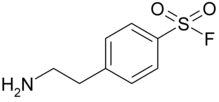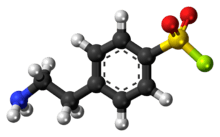AEBSF
AEBSF or 4-(2-aminoethyl)benzenesulfonyl fluoride hydrochloride is a water-soluble, irreversible serine protease inhibitor with a molecular weight of 239.5 Da. It inhibits proteases like chymotrypsin, kallikrein, plasmin, thrombin, and trypsin. The specificity is similar to the inhibitor PMSF, nevertheless AEBSF is more stable at low pH values. Typical usage is 0.1 - 1.0 mM.
 | |
 | |
| Names | |
|---|---|
| IUPAC name
4-(2-Aminoethyl)benzenesulfonyl fluoride | |
| Other names
Pefabloc SC | |
| Identifiers | |
3D model (JSmol) |
|
| ChEMBL | |
| ChemSpider | |
| DrugBank | |
| MeSH | AEBSF |
PubChem CID |
|
CompTox Dashboard (EPA) |
|
| |
| |
| Properties | |
| C8H10FNO2S.HCl | |
| Molar mass | 239.69 g/mol |
Except where otherwise noted, data are given for materials in their standard state (at 25 °C [77 °F], 100 kPa). | |
| Infobox references | |
Mechanism of action
Both AEBSF and PMSF are sulfonyl fluorides and are sulfonylating agents.[1] Sulfonyl fluorides act by reacting with the hydroxy group of the active site serine residue to form a sulfonyl enzyme derivative. This derivative may be stable for long periods of time except at high pH.[2]
Use in cholesterol regulation studies
AEBSF is extensively used in studies aiming to describe cholesterol regulatory genes due to its potent ability to inhibit Site-1-protease (S1P). This serine protease, located in the Golgi apparatus, is responsible for activating the sterol regulatory element-binding proteins (SREBP). By selectively inhibiting S1P, AEBSF can be used to characterize the downstream result of SREBP inhibition and its influence on cholesterol regulation.
References
- Powers JC, Asgian JL, Ekici OD, James KE (2002). "Irreversible inhibitors of serine, cysteine, and threonine proteases". Chem. Rev. 102 (12): 4735–4736. doi:10.1021/cr010182v. PMID 12475205.
- Gold AM, Fahrney D (1964). "SULFONYL FLUORIDES AS INHIBITORS OF ESTERASES. II. FORMATION AND REACTIONS OF PHENYLMETHANESULFONYL ALPHA-CHYMOTRYPSIN". Biochemistry. 3: 783–791. doi:10.1021/bi00894a009. PMID 14211616.